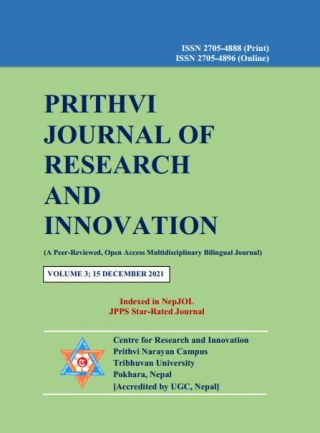Knowledge of Unsafe Abortion among Female Students in Nepal
DOI:
https://doi.org/10.3126/pjri.v3i1.41633Keywords:
Knowledge, perception, unsafe abortionAbstract
The term 'abortion' is a deliberate termination of unwanted human pregnancy. To save maternal health and life and control population growth, abortion has been legally permitted in Nepal since 2002. Most of the female youths stay away from home and are vulnerable to risky behavior regarding sex related matters. They have no proper knowledge about unsafe abortion. The objective of this article is to investigate the knowledge about unsafe abortion among the female youths in Pokhara. A descriptive cross-sectional study was conducted among 133 BBS first-year female students by using the simple random sampling. A self-administered questionnaire was prepared to assess the participants’ socio-demographic factors along with their knowledge about unsafe abortion. The association of knowledge was categorized with selected variables. Out of the 133 respondents, 49.6 percent were from the age group 19-20, 46.6 percent from the group of Janjati, 78.2 percent from the group of Hindu followers and 86.5 percent from the single respondents. The majority of the respondents (71.4 percent) were found to have the knowledge that over-bleeding was the consequence of abortion. Among the total respondents, 58 percent respondents had good knowledge about unsafe abortion and 15 percent had poor knowledge about unsafe abortion. No significant connection of age with knowledge of unsafe abortion has been observed during the study as the p value is greater than 0.05 at 95 confidence level, but other variables like caste, religion, place of residence and marital status have been found to have a significant relation with knowledge of unsafe abortion because p value is smaller than 0.05 at 95 confidence level.
Downloads
Downloads
Published
How to Cite
Issue
Section
License
Copyright (c) 2021 Centre for Research and Innovation (CRI), Prithvi Narayan Campus (TU)

This work is licensed under a Creative Commons Attribution-NonCommercial 4.0 International License.
© Centre for Research and Innovation (CRI), Prithvi Narayan Campus (TU)

